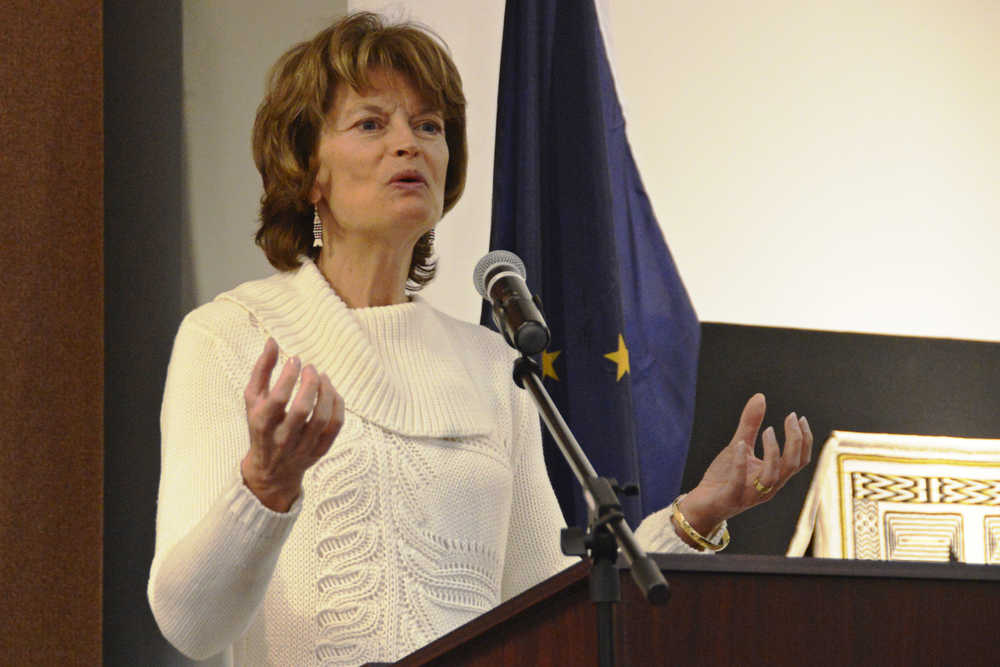Alaska’s Republican Senator Lisa Murkowski said that although the nation’s capital has earned a reputation for dysfunction, congress has recently managed to consider and occasionally pass legislation dealing with basic issues of education, infrastructure, and energy.
Murkowski gave a talk on congressional activity and its local effects to attendees of a Wednesday luncheon hosted by the Kenai and Soldotna Chambers of Commerce.
“I don’t want to put on total rose-colored glasses, because Washington, D.C., is in a stew right now,” Murkowski said. “But I do want to remind that we have made progress as a congress, at a time when people didn’t anticipate that progress could be made.”
Examples she cited included the educational standards of the December 2015 Every Student Succeeds Act, which replaced 2002’s No Child Left Behind legislation and which Murkowski said will put more education decisions on state and local authorities, as well as the Comprehensive Addiction and Recovery Act, which gives grants and support to treatment for opioid addiction, an increasing problem in Alaska.
Murkowski also emphasized infrastructure and energy, pointing to the Fixing America’s Surface Transportation (FAST) Act, a five-year funding plan for transportation infrastructure that she worked on as a member of a committee that reconciled House and Senate versions of the bill.
“The last time we had a multi-year highway bill was about 8 years ago,” Murkowski said. “What we’ve been doing are quick fixes — basically a year extension, an 18-month extension. Anybody out there who builds anything … knows that if you can’t predict beyond next year, it’s really tough to get going on any projects.”
She said the consistency of federal funding provided in a long-term transportation spending plan was especially important for local projects because of the decline of Alaska’s capital budget.
As chair of the Senate Energy and Resources committee, Murkowski co-sponsored (with another committee member, Washington’s Democratic Senator Maria Cantwell) the Energy Policy Modernization Act currently making its way through the senate, which she said had “a lot of focus on permitting, streamlining permitting.”
“We haven’t seen an energy bill that focuses on reform in over 8 years,” Murkowski said, adding that the technology and economics of energy production and delivery had changed significantly in that time.
In an interview after her speech, Murkowski said that some of the bill’s local effects would come through an easing of federal permitting processes. Murkowski said the bill reforms the licensing requirements for exporting liquefied natural gas — a licensing process that she said is currently “vague and undefined.” She referred to the Bradley Lake hydro facility, which generates much of the Kenai Peninsula’s electricity, when talking about what she called an excessive regulatory process for hydroelectricity that the bill is also intended to loosen.
“Our hydro re-licensing … process is so burdensome — because we’ve had one regulation lay over another regulation lay over another — that right now it takes about 10 years to re-license a hydrofacility,” Murkowski said. “Not to license a new one, where you have to do all of your (Environmental Impact Statements) and all of your studies, but to re-license an existing facility, to the cost of tens of millions, if not more, dollars. … If what we want to do is encourage greater use of renewables so we can reduce emissions — and hydro is right in the center of that — what are we doing? How have our policies limited us so dramatically that we can’t either continue the use or increase the use of hydro?”
During the comment session after Murkowski’s speech, Kenai city manager Rick Koch thanked Murkowski for help over the past ten years with Kenai’s attempt to halt erosion of the Cook Inlet bluffs below Old Town, for which the city has sought federal funding through the Army Corps of Engineers. On Feb. 24, 2014, Koch and two other Kenai officials visited Murkowski and Alaska’s other congressional delegates in Washington, D.C. to advocate for the funding, which was granted in May 2015.
Reach Ben Boettger at ben.boettger@peninsulaclarion.com.

